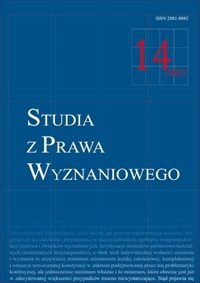Powstanie Polskiego Związku Katolicko-Społecznego
The Emergence of the Polish Catholic and Social Association
Author(s): Piotr SteczkowskiSubject(s): Law, Constitution, Jurisprudence
Published by: Katolicki Uniwersytet Lubelski Jana Pawła II - Wydział Prawa, Prawa Kanonicznego i Administracji
Keywords: law on religion; freedom of religion; the relations between the state, churches and other religious organizations; religious freedom; church - state relations (Poland); Churches and Religious Association; Catholic Church
Summary/Abstract: The idea of social Catholicism was burgeoning in pre-war Poland. After World War 2, the communist authorities of the People's Republic of Poland sought to eradicate any ideological opposition - including Catholics - from political and social life. Still, in the late 1960s, social Catholicism was revived also as legitimate organizations. This was possible after reaching a compromise with the authorities and owing to Primate Wyszynski's support. The establishment and registration in 1981 of the Polish Catholic and Social Association was the crowning achievement of the Catholic activists of the time, displaying political and social aspirations in the realities of a non-democratic state. This attainment required great political skills and legal and organizational capacity. This is shown in greater detail in the article which reveals the effort and work on the organization statute and political action taken by the first president of the association, Janusz Zablocki. The described circumstances of the registration fully reinforce the argument that law in communist Poland was no more but a political tool. The laws that had been designed to guarantee civil rights and liberties, including the right to association, had little or no material value if the political will of the ruling party was lacking.
Journal: Studia z Prawa Wyznaniowego
- Issue Year: 2011
- Issue No: 14
- Page Range: 161-185
- Page Count: 25
- Language: Polish

